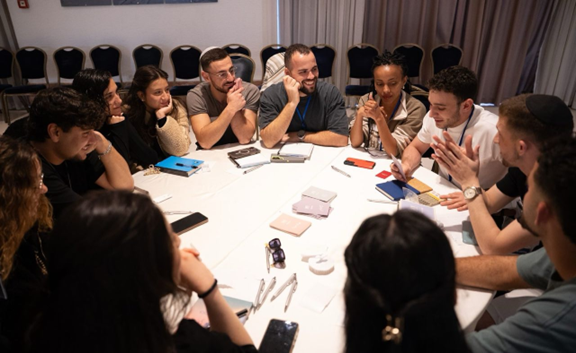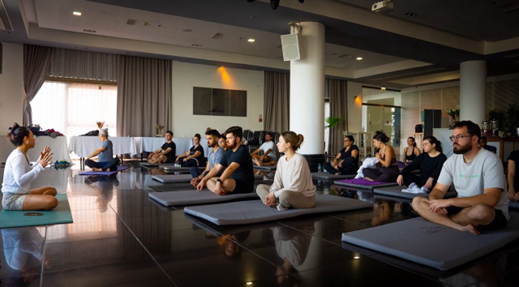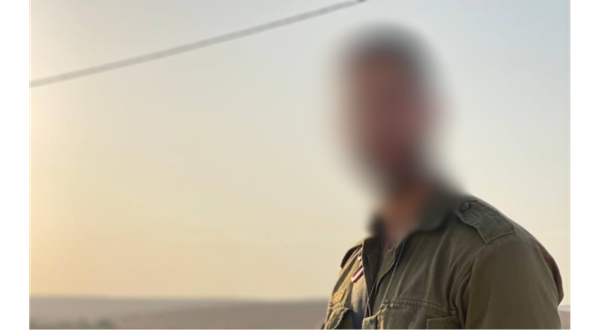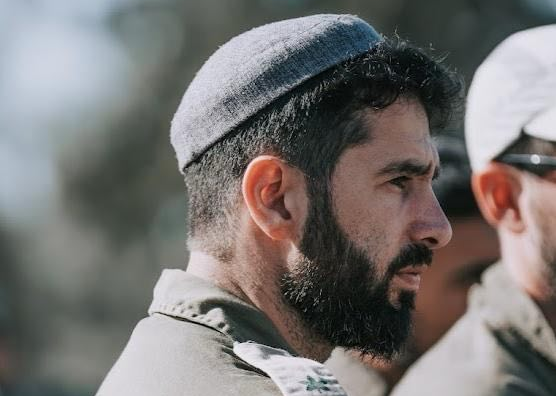Young Israelis, raised amid national disasters and devastating wars, are paying an unbearable price. Since the October 7 terrorist attack, twenty-somethings have largely abandoned the traditional post-army trip abroad. Instead of yoga retreats and silent meditation workshops in India, they are cycling through endless reserve duty, coping with trauma, mourning fallen friends and putting their careers and dreams on hold.
To help them reconnect with themselves and resume their lives, the nonprofit Masa El HaOfek (Journey to the Horizon) was established by former Navy commander Ram Rothberg and social activist Alan Freeman. Founded in collaboration with the Ministry of Defense, the organization runs a two-and-a-half-month program offering tools for emotional recovery, career planning and academic direction.
Participants engage with leading Israeli companies, attend lectures and workshops and receive one-on-one coaching to help identify and pursue their personal goals. “They served us,” Rothberg said. “Now it’s our turn to serve them.”
Among those who gave everything on October 7 is Sergeant First Class (res.) A., a 23-year-old Druze from Daliyat al-Karmel who serves in an intelligence unit in southern Israel. That day, he endured prolonged trauma after leaving the bomb shelter under heavy fire to reach a bunker and relay intelligence—while surrounded by terrorists for several days.
“I was the first to leave the bomb shelter heading to the bunker because I realized it was a death trap,” he recalled. “I understood I wanted to live. You can’t hesitate—it’s a risk to step out under rocket barrages. It was a real battlefield. I never imagined anything like it. I never thought I’d walk the thin line between life and death.”
How did you know to get out of the shelter?
“Intuition. I grabbed everyone and told them, ‘Guys, we have to get out of here. We can’t just sit and wait for death.’ We didn’t have any magazines. It was a risk calculation. My gut told me the terrorists would get here. And that’s exactly what happened.”
How did you manage to escape the terrorists?
“The terrorists were just 200 meters from me. As we ran from the bomb shelter, I heard bursts of gunfire—AK-47s. A rocket landed right next to me, and I was thrown backward,” A. recalls. “While running, I yelled to the guys, ‘Keep running—don’t look back.’ I couldn’t believe it was real, but we kept transmitting from the bunker. I know how valuable I am as an Arabic speaker—how critical my intelligence can be in real time. Every second of that kind of information can mean life or death.”
4 View gallery


The platform that gives young people a chance to build a future
(Photo: Natan Shalev)
Between reserve duty rotations, A. joined the Masa El HaOfek program. “The program helped pull me out of the depression I was in and brought back the light,” A. explains. “Meeting people my age again, seeing joy, realizing that not everything is about terrorists and war—that you can plan life ahead. At first, it felt strange because I constantly live with the noise in my head from what happened, from everything I saw. But they managed to quiet it.”
During the program, A. discovered that the degree he had always wanted to pursue was closer than he thought. Today, he’s finishing his first year of information systems studies at the University of Haifa.
“The program gave me a path to a degree without needing a psychometric exam,” he says excitedly. “That’s usually a tough process, so getting it handed to me on a silver platter through the program—it was amazing. I’m now finishing my first year of university. I couldn’t be happier. I’ve made progress in life. The program introduces us to academic institutions— being there is completely different than just seeing them on a screen.”
The program also helped A. realize another dream. “As I ran to the bunker under fire, not knowing what would happen to me, I thought about her—the woman I hadn’t met yet, to whom I’d give my soul. The program helped me understand that truly living, for me, means starting a family.” Three months after completing the program, he met his fiancée. “She’s the love I was waiting for. The program prepared me for it, pointed me toward it—and right after, it happened.”
In addition, A. has started writing books and working on a documentary film. He credits this creative surge to the program as well, which helped him reconnect with himself. “Ram (Rothberg) told me, ‘You’re special—I know you’ll succeed.’ Those little things—they can change everything.”
Even the mentors of the Masa El HaOfek program are not immune to the ongoing challenges of war. Among them is Max Kaplansky, 30, a husband, father of one and a reserve major in an elite unit who fought on October 7. He lives in Moshav Klachim, near Netivot, where he was raised.
“We’re guiding a group of 20 to 25 young men and women from the Gaza border communities,” he says. “I can sense a gap in their resilience, in their sense of capability. It’s getting worse because the situation creates a deep sense of uncertainty. A survival mindset is embedded in everyone who grew up in the Gaza border region—especially after October 7.”
The group meets twice a week, in addition to one-on-one sessions with a coach and meetings with leaders from the business and employment sectors. “We also do ‘A Day in the Life,’ where participants can shadow someone, like a cybersecurity expert. It exposes them to different fields so they can start figuring out what they want to do. This group has been largely neglected by our society. They come out of their army service not knowing who they are or what they want.”
Get the Ynetnews app on your smartphone: Google Play: https://bit.ly/4eJ37pE | Apple App Store: https://bit.ly/3ZL7iNv
Kaplansky knows firsthand how difficult the transition from combat reserve duty to civilian life can be. “You live from one round of fighting to the next. There’s always this cloud of uncertainty hanging over you. It shakes your mental balance. Even when I’m back in civilian life, my heart is still in the war and with the hostages.”
Amid the chaos of Israel’s never-ending wars, he finds a sense of normalcy through his work with the nonprofit. “I believe this project is more essential than ever,” he stresses. “It gives me a sense of purpose and fulfillment. It forces you out of survival mode. We’ve helped reservists from Ashkelon, Netivot and the Gaza border region regain peace of mind and self-confidence.”
4 View gallery


Guidance for the future: Young men and women in a workshop by the Masa El HaOfek nonprofit
(Photo: Courtesy)
“For example, a 20-year-old woman who had contributed immensely to the country after October 7 came to us lacking confidence, shy and quiet,” he said. “Suddenly, she started speaking in front of an audience. She told us, ‘Without this program, I don’t know how I would have moved forward.’”
Kaplansky explains what keeps him grounded during these turbulent times. “It’s the feeling of being part of something bigger,” he says. “Every young man and woman needs to see how they’re connected to the State of Israel, the people of Israel and the enormous change we want to create here. This project isn’t just about helping people become career-driven or make millions. We want to build a strong society—one with resilient young people who not only succeed personally but also contribute to the State of Israel.”




